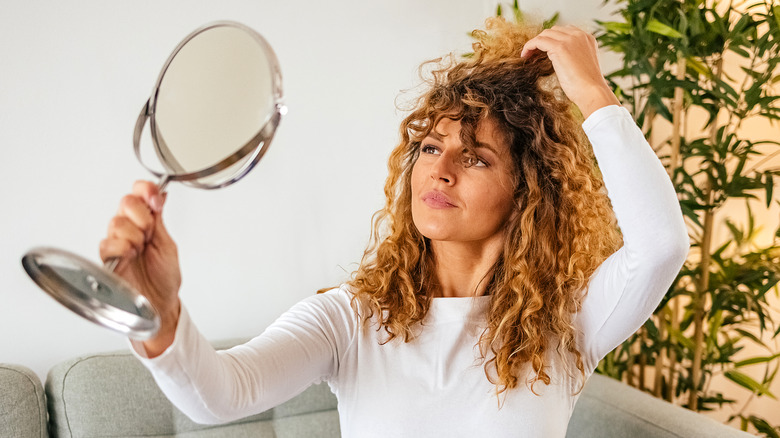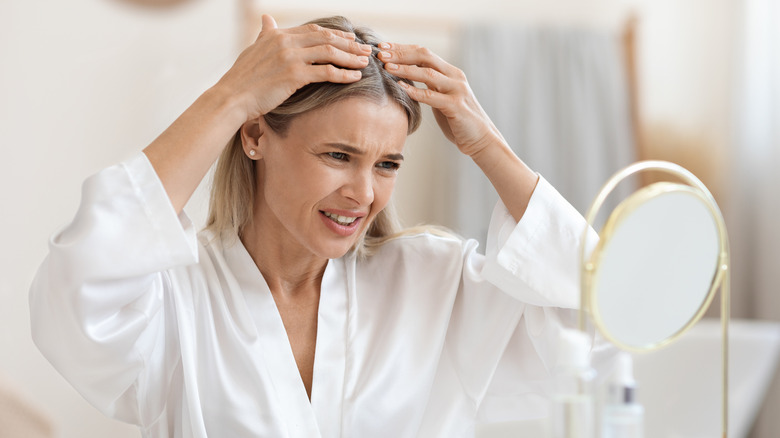What's The Difference Between Dandruff & Seborrheic Dermatitis?
If you've ever noticed flakes in your hair, you'd be forgiven for automatically assuming you have dandruff. But not so fast. There's also a chance what you're noticing on your scalp may be seborrheic dermatitis. But what's the difference between the two?
Well, seborrheic dermatitis is actually a type of eczema and can leave redness, flakes, and dry patches on the skin. It's not just contained to the scalp, and can actually appear on a few places on the body. As for dandruff, which is known in the medical community as pityriasis capitis, that caused flakes that only appear on the scalp and is actually a milder form of seborrheic dermatitis.
One of the big differences between the two, according to hair and scalp expert Anabel Kingsley, is that you may notice redness and inflammation with seborrheic dermatitis, but you shouldn't so much with dandruff. She also shared that seborrheic dermatitis flakes will look a little different. "[They're] often sticky, slightly yellow, and firmly stuck to the scalp," she told Teen Vogue. While seborrheic dermatitis flakes will look more scaly, dandruff flakes tend to be finer and, well, just more flaky. People with dandruff also tend to find their scalp itches. And although dandruff is a type of seborrheic dermatitis, there can actually be different causes and treatments for the two.
What causes seborrheic dermatitis and how to treat it
When it comes to seborrheic dermatitis, there's still research to be done on exactly what causes it. But, according to Healthline, research has suggested that there may be two things may be responsible when it's found on the scalp. The first is too much oil being produced, which may irritate the scalp, and the second is an abundance of yeast called Malassezia, which then inflames the scalp and leads to increased oil.
As for how to stop this increased oil production, Anabel Kingsley told Teen Vogue that a lot of stress, a poor diet, and changes in hormones can be factors. So, if you're looking to stop seborrheic dermatitis occurring, she recommended not eating a lot of dairy products and cutting down on sugar. One thing you don't want to do, though? Moisturize the area. Though seeing flakes on your scalp may make you think it needs extra moisture, it's a really bad idea to treat seborrheic dermatitis like a dry scalp. Dermatologist Patricia Wexler admitted any moisturizing products will likely only make the issue worse and could also irritate the scalp. You'll also want to stay away from things like hairsprays and gels, but carry on shampooing as normal as that will help to get rid of the build up.
If you believe you have seborrheic dermatitis, it's a good idea to seek medical attention. That's because a dermatologist will be able to give a personalized diagnosis and treatment.
Dandruff may have different causes and need different treatment
There are a number of things that may cause dandruff. Healthline claimed fungal colonization, over-brushing the hair, an aversion to haircare products, wearing too many hats, and even under and over-shampooing the hair can all lead to dandruff. There are plenty of other suspected causes of dandruff too, including certain medical conditions and dietary issues.
Just like there are many causes, there are also many ways to treat dandruff. Of course, one of the most obvious and easiest methods is to try dandruff-specific haircare products, with anti-dandruff shampoo being one of the most common. The American Academy of Dermatology Association actually recommends trying a couple of different dandruff shampoos until you find one that works for you. It's important to let the shampoo sit on your scalp for around five to 10 minutes before washing it off to allow it time to really treat the area. Another tip for treating dandruff is keeping your scalp out of the sun. That's because burns can not only result in more flakes appearing on the scalp, while some anti-dandruff shampoos may also make the scalp more susceptible to sunburn.
Though people with mild dandruff usually won't need to seek out medical attention, it may be time to see a professional if the symptoms don't seem to be clearing up after a few months. A medical professional may be able to prescribe medication or a stronger shampoo.


